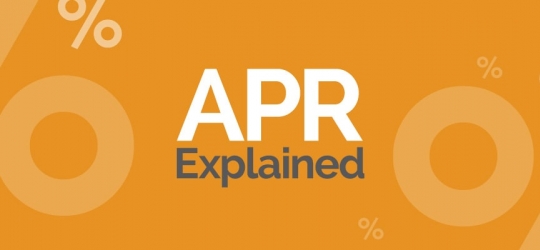What does APR mean?
Author: Simon Ellis

APR. It’s those three little letters that follow a stated percentage on any sales pitch offering you credit. APR is associated with loans, credit cards, store cards, car finance, as well as many other financial products… But what does it mean? Well, look now as we explain APR and give you some tips about the way it works so you don’t end up paying more than you should.
The definition of APR
APR stands for Annual Percentage Rate. It’s the rate of interest charged on the money you borrow over the course of a year. As you pay your debt back, you’ll pay progressively less interest on the outstanding amount because it’s getting smaller. Importantly, the APR remains the same until the end of the credit agreement.
Why should I check the APR?
Naturally, when you’re shopping for a financial product and committing to honouring its terms, you want to make sure you’re getting the best deal for you. That’s why you should ALWAYS check the APR before you agree to the contract. After all, there might be a much more suitable product out there in the marketplace from a different lender.
Loans vs credit cards
APR on most credit cards is between 15% and 25%. This can seem high compared to some loan and finance products that can have APR as low as 2-3%, or even 0% for a limited time. As a result, long-term borrowing on credit cards is arguably unwise. However, credit cards DO represent a convenient and flexible way to borrow money over the short-term without entering into a lengthy contract.
Why are some APR rates low while others are high?
If you can’t secure credit at what seems like a reasonable rate of APR, then it’s probably because you have a less than ideal credit history and overall credit score. Lenders create products with higher APR for people with poor credit ratings because the higher rate of return for them mitigates the risk. Indeed, some products like payday loans come with eye-watering rates of APR, often in the thousands of per cent.
What if you can’t get a decent rate?
If you can’t get what you believe to be a decent rate of APR on a credit agreement, there are still some options available to unlock the right deal. For example, on finance and mortgage deals you may obtain a better rate by increasing your deposit. On some loans you may be able to secure credit against some collateral you own. Another option is to find a guarantor who will agree to make the repayments on your behalf if you default on the agreement.
The Compass view on APR
David Mills from Compass said: “At Compass our financial services experts work hard to get the very best deal for our customers. There are thousands of products on the market with many different variables at play. That’s why we always take the time to understand a customer’s individual circumstances.”
You can find out more about personal finances and products that can help you support them, including loans and mortgages, by contacting us via phone or email now.
Why not get in touch today?
For a friendly, confidential and without-obligation conversation
Your home may be repossessed if you do not keep up repayments on your mortgage.
